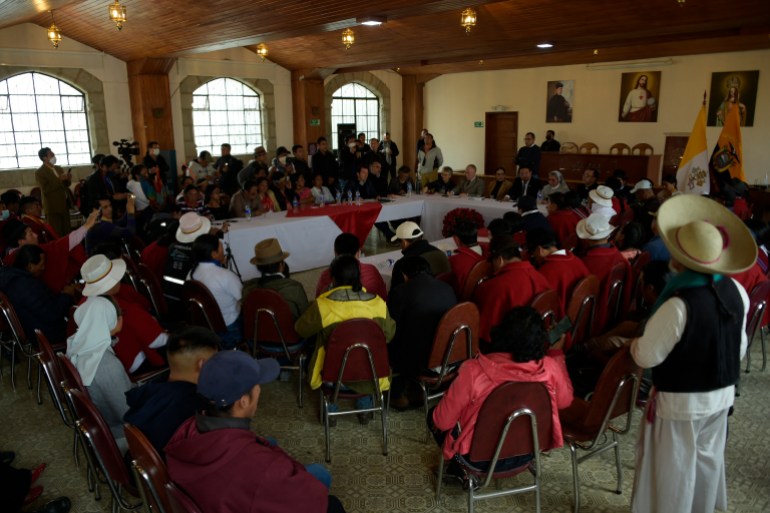Talks to begin as demonstrations against rising costs of living have paralysed parts of the South American country.
The Indigenous organisation leading protests in Ecuador has agreed to hold talks with the government, as the South American nation has been rocked by mass demonstrations over the last two weeks.
The Confederation of Indigenous Nationalities of Ecuador (CONAIE) said in a statement that it expected to meet with officials from President Guillermo Lasso’s government on Monday.
The dialogue could help bring an end to several days of anti-government protests in the capital, Quito, and elsewhere, which began on June 13 in anger over mounting fuel and food costs, among other social issues.
Lasso late on Sunday announced a 10-cent per gallon cut to gasoline and diesel prices in a bid to quell the unrest, which has paralysed parts of the country.
But CONAIE said ahead of the meeting planned for Monday afternoon that the price cut alone is “insufficient” to end the strikes and would not do enough to address “the situation of poverty faced by millions of families”.
The organisation has demanded compliance with a 10-point agenda, including the reduction of the price of extra gasoline from $2.55 to $2.10 a gallon and diesel from $1.90 to $1.50.
Speaking on national television on Sunday, Lasso said the price of fuel “has become the cornerstone that maintains the conflict”.
“Ecuadorians who seek dialogue will find a government with an outstretched hand, those who seek chaos, violence and terrorism will face the full force of the law,” he said, emphasising that the country must return to normality.
Lasso also lifted a state of emergency imposed in six of the country’s provinces as Ecuadorian opposition legislators raised the possibility of removing him from office amid the strikes. CONAIE had insisted on an end to the state of emergency as a prerequisite for beginning talks.
Indigenous protesters have called for a decrease in the price of gasoline, price controls on agricultural products, and more robust investments in education, health care, and employment. Lasso previously accused the strikes of laying the groundwork for a coup.
After several years of a particularly severe COVID-19 crisis, rising inflation and unemployment have pushed many to join the protests.

On Thursday, Indigenous groups stated that a demonstrator had been killed by pellet wounds to the chest and abdomen during rallies near the National Assembly in Quito.
About 100 others have suffered injuries, and human rights groups have expressed concern over the brutality of the crackdown against protesters. Law enforcement officials tweeted that officers had also been injured.
The protests have brought the capital to a near standstill, and instances of looting are said to have occurred. Road blockages are reported to have been eased in some cases to allow more food into the city, where shortages have become a source of concern.
Post a Comment